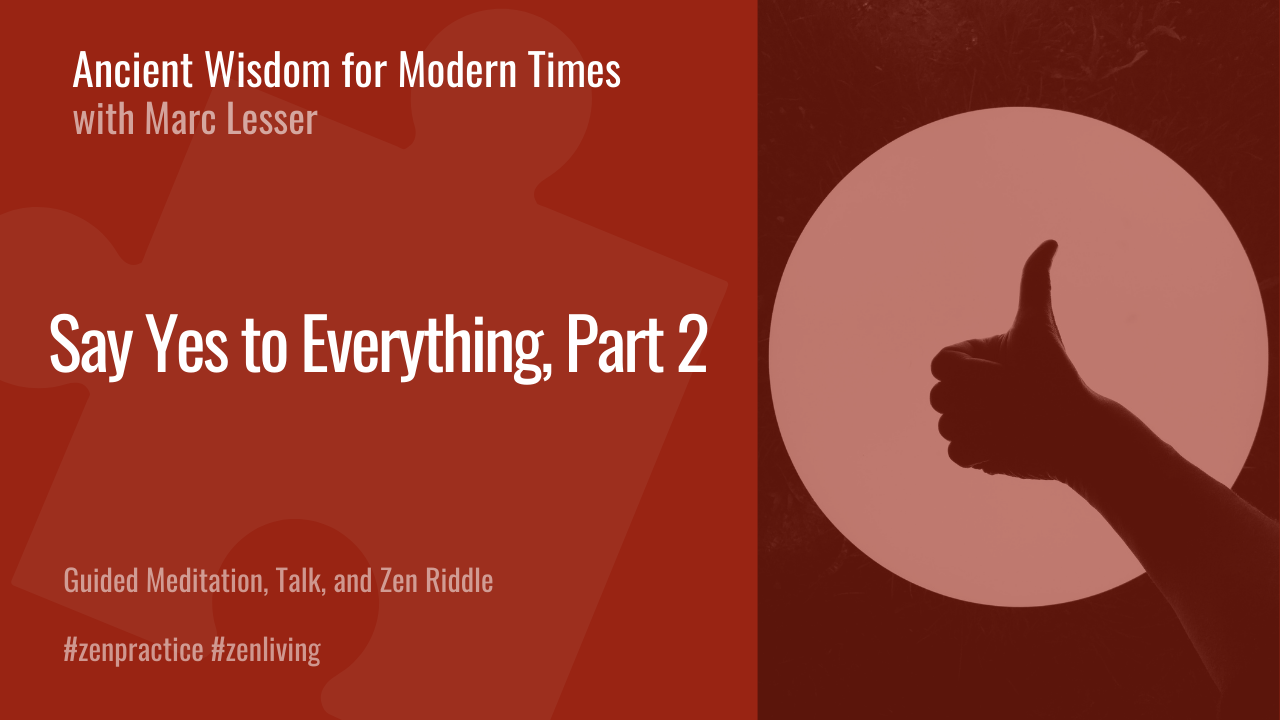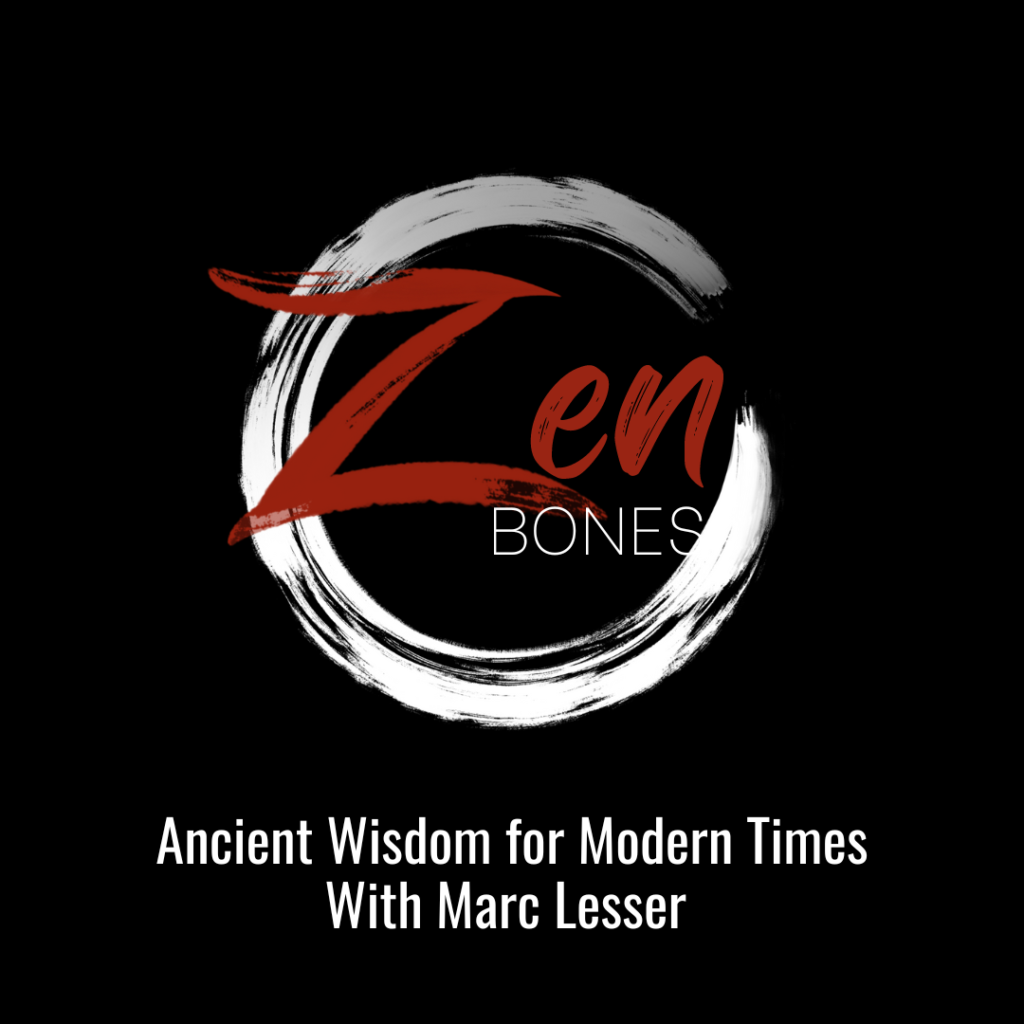In this episode, Say Yes to Everything, we begin with a short guided meditation, followed by a talk on the practice of saying yes – opening and accepting whatever comes our way. It means noticing and saying yes to the pains and possibilities, our resistance and our joy.
Today’s Zen puzzler is based on a traditional Zen dialogue. What is the Way? Everyday mind is the way.
EPISODE TRANSCRIPT
Welcome to Zen Bones. This is Marc Lesser. Zen Bones is a bi weekly podcast that features conversations with leading spiritual teachers and activists. And it’s an exploration of how Zen teachings and practices can inform and support your everyday life. Please support our work by making a donation at marclesser.net.
It would be most appreciated. Thank you.
Today’s episode is called Say Yes to Everything. We begin with a short guided meditation, followed by a talk on the practice of saying yes, opening and accepting. Whatever comes our way, it means noticing and saying yes to the pains and the possibilities, as well as our resistance. And of course, our joy. And today’s Zen Puzzler is based on a traditional Zen dialog.
What is the way? Everyday mind is the way of another form of saying yes to everything. I hope you enjoy this episode. And let’s begin with just a few minutes of sitting together. You know, just stopping, pausing, noticing whatever’s happening right now, checking in, checking in with the body, noticing any places that need some attention. For me, it’s often my shoulders up or back, relaxing the muscles in the face, relaxing the jaw and the whole body taking in the whole body, noticing, and of course, noticing that breathing is happening, perhaps taking a few deeper than normal, clearing breaths.
Yeah. So checking in with the body, checking in with the breath, noticing whatever is happening with thoughts, with thinking, mind, with the mind is busy or calm. Just noticing and noticing whatever feelings, whatever mood feelings you’re bringing to this time and just shining the light of your awareness on what it’s like to be here. A very ordinary and extraordinary This human mind and body consciousness.
And of course, also maybe checking in with what is in your heart right now, mixed in or holding or below the underneath the surface of our awareness.
Yeah, the heart. The heart. What’s coming up for you as most important, compelling thing right now? Yeah. Zen. Zen practice uses the language of a small mind and big mind an entire. This heart awareness takes us closer to big mind. And I think a big mind is in some way letting it all go. So with maybe practicing with every exhale, letting go of judging, naming, expecting anything, what does it feel like?
What is it like when we can just be here? Just noticing again? Starting by stopping. Checking in with the body, with the breath, thoughts, feelings. And then as much as possible, letting it all go. It’s ordinary, ordinary mind and big mind. Studying the self and going beyond the self and just appreciating whatever, whatever is there. Noticing. Dropping. Appreciating.
Allowing your own sense of love to arise. Once we get out of the way and feel free to continue sitting or I’m. I’m going to ring the bell and shift into doing some little bit of talking.
So I want to talk about one of my one of my favorite practices, which is the practice of saying yes. Maybe saying yes to everything. And it reminds me of I’ve I’ve done many improv classes, you know, improvizational theater classes. I’ve taken improv one on one many times. Safe. I jokingly say that I’ve failed it and had to retake it and what I really like about Improv 101 is that it emphasizes saying, Yes, the main lesson is to whatever comes your way in, whatever, whatever someone proposes to you.
And when you’re practicing improv, the practice is to accept it and go with it and say yes to it and see what happens. And I think this is a really exceptional, interesting practice in our lives, right in all of our relationships. You know, the I was also someone was asking me, what’s the most important practice for leaders, for people, for entrepreneurs, people starting companies, people leading companies.
And I was surprised that when I was asked that question, I responded by saying learning to say yes to everything. Right. And in some way, it’s a way of simple and profound way to open our hearts and our minds to the gifts and many challenges, possibilities. Right. The and the pains and possibilities, the gifts, the suffering, whatever it is to say yes to it, to open to it, to not turn away.
And, of course, you know, it’s a practice also that allows us to recognize and feel our resistance and to work more skillfully with our resistance. Because it’s not easy. We we it’s easy to block to say no, to change the subject. So saying yes, even to our resistance by fully letting in our fears, our discomfort. And then part of this part of this practice of saying yes to everything is allowing and transforming fears and discomfort to allow them to become a connection and possibility again through through not turning away through this practice of saying yes and seeing what happens.
And this expression saying yes to everything emerged fairly recently when I was having a conversation with my friend and poet Jane HIRSHFIELD. And we were Jane and I were exploring in poetry, poetry, Zen and and well-being. And Zen then brought up this phrase of saying yes. And she said, Poetry and Buddhist practice offer a way to stay inside the difficult moments, how to be open to every possible weather of our existence, and to understand that these lead to the moonlight shining through the ruined house roofs.
It’s the beauty of poems married to the difficult circumstances that lead to the experience of the fullness of life. A life that is more satisfying. So this practice of saying yes means to become more familiar with, as Jane puts it, the weather, the weather of our existence. And this can be a way of cultivating confidence and humility, becoming more skillful and effective in the practice of leadership relationships, life know.
And and as I was applying, applying this to the practice of management or leadership, and I was thinking of the, you know, the most common elements that I find I’m engaging within leaders. And those those elements are decision making, inspiring and influencing others healthy and effective communication, teamwork and collaboration, achieving results and innovation and managing change. So just unpacking these quite briefly, but one at a time.
So decision making, right? So saying yes to becoming more aware and more clear about how how we make decisions. Noticing in what way do our decisions benefit the greater good benefit ourselves. But seeing seeing decision making through the lens of saying yes, yes to how does this decision benefit my own well-being and how is this decision benefiting the greater good?
Yeah. So the second the second practice is inspiring and influencing others, Right? So saying yes to expressing what matters, saying yes to positive influence. And so the third is healthy and effective communication, Right? So saying yes to having genuine conversations, saying yes to having cultivating more meaningful relationships.
The fourth is the practice of teamwork and collaboration. Yeah. So saying yes to building great teams and cultivating healthy cultures, coming back again and again to that and the fifth practice is achieving results, right? So saying yes to closing the gaps between whatever your end vision is and where you are now. When I come back to this, this practice again and again of having the clarity and the courage of going after things, achieving great results.
But it means noticing and staying with saying yes to that discomfort, of seeing the gaps between what those visions and plans and expectations are and wherever we are now. And the sixth practice is about innovation and change, right? Saying yes to seeing the world through fresh and new eyes and appreciating, appreciating change, appreciating uncertainty and managing skillfully managing transitions.
So how’s it going? How are you doing with this practice of saying yes to everything? Can you open your heart and mind to saying yes to the challenges, the pains, the grief and the possibilities and the joy by saying yes to letting go of habit energy, of regrets and missed opportunities, saying yes to all of the gifts of your life, to loss to death, and to the many possibilities for extraordinary and ordinary health, wellbeing and healing.
Yeah. So exploring exploring this practice of saying yes to everything. Welcome to the Zen Bones Puzzler, where I will regularly be presenting a story or a Zen cone or a poem, something to contemplate, to think about a story that has purpose. It’s about developing greater insight and reflection. Not so much for a solution, but as a way to support your practice, a kind of meditation in daily life.
And so today’s today’s Zen Puzzler, right? So this is and I so appreciate it, looking at looking at, you know, I think Zen Zen is often very, very serious. And I’m I’m taking these very serious Zen teachings, the traditional Zen koans and using the word instead of koan, using the word puzzler as a way of adding a bit of humor to the practice.
I think I think humor was and Zen has a way of not taking itself so seriously, which is one of the things that really attracted me to the practice. Right? Tremendous seriousness, looking, looking at life and death without turning away and at the same time being able to laugh at ourselves, to see the amazing humor and to find the ability to play right in the midst of this tremendous serious seriousness.
And so in some way, the same practice, you know, in some way many of Zen koans are about saying, yes, as I was just talking about. So there’s a famous one of the most famous Zen stories, which I keep coming back to, is where the student asks the teacher, What is the way, what is the way, and how can I find more calm, clarity, equanimity, wisdom, whatever it is, and and this this particular response is ordinary mind.
Ordinary mind is the way which feels to me a lot like saying yes, right. Not not blocking, not making things difficult, not looking for something outside of ourselves, but ordinary mind. Ordinary mind is the way ordinary mind. The mind of seeing uncertainty and change, of also seeing, you know, what we are certain about and the changeless right to the depths of our minds and hearts.
And and as I’m saying this, I’m hearing the sounds of some birds outside my window and I’m anticipating the garbage trucks that pull up every Friday morning in my my home. Ordinary, ordinary mind is the way what is the way ordinary mind saying Yes, same yes to yourself. Yeah. And, you know, part of this part of this traditional koan is not being caught by yes and no thinking by knowing or not knowing.
Right. There’s a line. Right. Knowing knowing is arrogance and not knowing is stupidity. So what is the way? The way is to say yes. The way is to say yes to ordinary extraordinary mind. So you might try practicing this week with ordinary mind coming back to trusting, unpacking, cultivating that ordinary mind is the way. Thank you very much.
I hope you’ve appreciated today’s episode. To learn more about my work and my new book, Finding Clarity, you can visit my website marclesser.net. This podcast is offered freely and at the same time it relies on financial support from listeners like you. Thank you very much.









